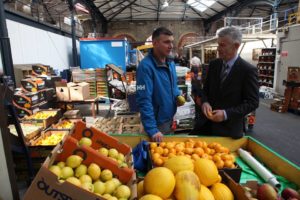Overall 2019 has been a very good growing season with a good balance of sun, rain and heat. Despite this, there is an unsettled feeling among those of us working in horticulture. A challenging labour market, poor margins, Brexit fears and increasingly changing weather patterns make this a very uncertain time. The world is changing on many fronts and consumer needs are changing too.
As coordinator of the Horticulture Industry Forum (HIF), I am familiar with how HIF is working to support the horticulture industry through some of these challenges and to position the industry to take advantage of opportunities that are emerging. Our information seminar held earlier in the year, on the pilot work permit programme appears to be bearing fruit. At a meeting with the Department of Business, Enterprise, and Innovation (DBEI), the IFA learned that a total of 322 horticulture work permits, which enable producers to employ staff from outside the EU and EEA, had been issued by the start of September last. Given that there is a total of 500 permits available until May 2020, it is likely that all the permits will be taken up in the coming months. Overall, the pilot has been a success but there have been some teething problems and unsuccessful applications. In the coming months, HIF will review the pilot and will be working to secure an accessible and more permanent scheme beyond May 2020.
The increasing trend towards plant-based diets here at home and internationally potentially provides opportunities for horticulture. This trend to plant-based diets is cited in the supporting information supplied by DAFM as part of its Agri-Food 2030 public consultation. In HIF’s submission to this consultation, we have outlined several areas were horticulture can contribute to the development of Agri-Food. However, HIF has also used its submission to urge that a substantial increase in resources, particularly in the area of R & D is required to support the industry to exploit the opportunities that are emerging. HIF proposes that R & D resources of a proportional scale (to those afforded to other sectors) are provided to Horticulture, through Teagasc and other appropriate channels. More R & D is required to guide, advise and inform our capacity to grow new crops and improve the production of existing crops. The HIF submission also highlights the contribution that amenity horticulture can make to improved mental and physical health, and underlines how the growing of more fresh produce can help the fight against obesity. To really exploit these opportunities the horticulture industry needs to undertake effective marketing. Although the potato and mushroom sectors have managed to access available EU funding to undertake generic marketing campaigns, other sectors have to date, failed to do this. In the coming months, HIF will be discussing the potential of the industry to raise funding across all sectors. If this can be achieved, it would enable the industry to leverage additional national and EU funding to support the development of horticulture in Ireland.
DAFM have conducted one public consultation in relation to its Climate Change Adaptation plan and is expected to launch a second Climate Change public consultation on its Mitigation Plan in the coming months. HIF have through its Adaptation submission (and will through its Mitigation submission) highlighted the significant contribution horticulture can make to the National Climate Action plan by supporting Ireland to become more food secure through growing more fruit and vegetables here and by growing and planting more trees to capture carbon, which would reduce national GHG emissions.
It is a time of great uncertainty, but horticulture can provide many solutions to the challenges that we face. This industry is has begun to work more closely together. The formation of a number of new Producer Organisations is now likely and will increase the cohesiveness of this industry. HIF is also striving to support greater cohesiveness. If we work more closely together, we can build a prosperous and sustainable future for the horticulture industry. Ní neart go cur le chéile!




